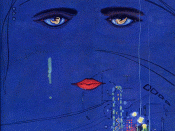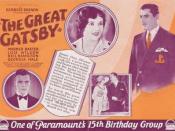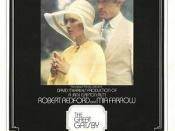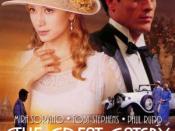At first, the female characters in FitzgeraldÃÂs "The Great Gatsby" seemed to be rather dissimilar. Daisy was the angelic and innocent beauty, Jordan was the androgynous golfer, and Myrtle was the sensuous and vivacious seductress. One was from the holy heavens above, another from the sinful depths below, and the last from the neutral in between. Seems like a good balance, however, as the story progresses, we see more and more that the angle is a fallen one, and that the human is a demon in disguise. All three women in this novel use men in some form to get what they want. Looking at the depictions of the female sex in this novel, I believe that, yes, Fitzgerald was a misogynist.
Daisy is a careless siren who uses everything given to her by birth to win what she loves, namely attention, adoration, and social status. The only thing that will give her the three is wealth, and the only thing that can give her wealth is Tom Buchanan. Despite having supposedly ÃÂchangeÃÂ her mineÃÂ (Fitzgerald 74) just prior to their wedding, Daisy still ÃÂmarried Tom Buchanan without so much as a shiverÃÂ (75), and very eagerly uses her new-found money and power to buy her way to the top. It is evident that, from DaisyÃÂs point of view, true love cannot compare to the money and adulation she craves. Upon her reunion with Gatsby, the first in five years, she breaks down into tears because sheÃÂs ÃÂnever seen suchÃÂ beautiful shirts beforeÃÂ (89). The beautiful shirts owned by Gatsby have proven to Daisy that he is even wealthier than Tom, and this fact sends Daisy into a deep lament. That is, if she had just stayed with Gatsby from the beginning, sheÃÂd be receiving even more attention and adoration than the already considerable amount she possesses at present because Gatsby could have offered her even more than the immense fortune she already holds. Poor, poor girl.
Jordan is the least female of the three females, and I believe this is the reason why Fitzgerald did not have her meet an untimely death, destroy familial relations, or come to any other end she could have at the mercy of a woman-hater. Jordan is representative of the wives and daughters who emerged from WWI as androgynous, self-esteemed, and slightly misandric ÃÂnewÃÂ women. When Nick first meets Jordan, she was perceived as ÃÂbalancing something on it [her chin] which was quite likely to fallÃÂ (14). Though it is not directly stated, I think Jordan is balancing ÃÂmenÃÂ on her chin. ÃÂNewÃÂ women like Jordan donÃÂt need men, and thus they must use men to prove just that.
Myrtle is the home wrecker of the novel. As a direct result of her affair with Tom, she gets herself killed, which leads Wilson into shooting Gatsby, which obviously puts an end to the Gatsby and Daisy affair, the result of which leaves Nick disgusted and breaks it off with Jordan. Besides ruining the lives of everyone around her, Myrtle also meets the most tragic end of all the females in the novel. She is killed on impact in a gruesome car accident, while both Daisy and Jordan are at least left with the prospect of a fresh start. I believe this is because Myrtle is the most feminine of the three. Nick describes her as ÃÂsensuousÃÂ, and despite possessing ÃÂno facet or gleam of beauty, there was an immediate perceptible vitality about her as if the nerves of her body were continually smoulderingÃÂ (28). If Fitzgerald was not a misogynist, then how could someone whose vice is simply being too much of a woman deserve an end as graphic as a ÃÂleft breast hanging loose like a flapÃÂ (131)?This novel is certainly not one of ÃÂhappily ever aftersÃÂ, and I believe the fact that women are portrayed as the causes of all the tragedies within this novel is reason enough to proclaim Fitzgerald as a misogynist.





